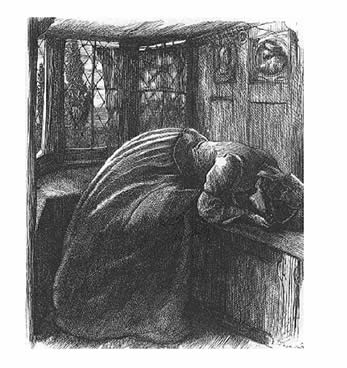Mariana
With blackest moss the flower-plots
Were thickly crusted, one and all:
The rusted nails fell from the knots
That held the pear to the gable-wall.
The broken sheds looked sad and strange:
Unlifted was the clinking latch:
Weeded and worn the ancient thatch
Upon the lonely moated grange.
She only said, 'My life is dreary,
He cometh not,' she said;
She said,'I am aweary, aweary,
I would that I were dead!'
Her tears fell with the dews at even;
Her tears fell ere the dews were dried;
She could not look on the sweet heaven,
Either at morn or eventide.
After the flitting of the bats,
When thickest dark did trance the sky,
She drew her casement-curtain by,
And glanced athwart the glooming flats.
She only said, 'The night is dreary,
He cometh not,' she said;
She said,'I am aweary, aweary,
I would that I were dead!'
Upon the middle of the night,
Waking she heard the night-fowl crow:
The cock sung out an hour ere light :
From the dark fen the oxenÕs low
Came to her: without hope of change,
In sleep she seemed to walk forlorn,
Till cold winds woke the gray-eyed morn
About the lonely moated grange.
She only said, 'The day is dreary,
He cometh not,' she said;
She said,'I am aweary, aweary,
I would that I were dead!'
About a stone-cast from the wall
A sluice with blackened waters slept,
And o'er it many, round and small,
The clustered marish mosses crept.
Hard by a poplar shook alway,
All silver-green with gnarled bark:
For leagues no other tree did mark
The level waste, the rounding gray.
She only said, 'My life is dreary,
He cometh not,' she said;
She said,'I am aweary, aweary,
I would that I were dead!'
And even when the moon was low,
And the shrill winds were up and away,
In the white curtain, to and fro,
She saw the gusty shadow sway.
But when the moon was very low,
And wild winds bound within their cell,
The shadow of the poplar fell
Upon her bed, across her brow.
She only said, 'The night is dreary,
He cometh not,' she said;
She said,'I am aweary, aweary,
I would that I were dead!'
All day within the dreamy house,
The door upon their hinges creaked;
The blue fly sung in the pane; the mouse
Behind the mouldering wainscot shrieked,
Or from the crevice peered about.
Old faces glimmered through the doors,
Old footsteps trod the upper floors,
Old voices called her from without.
She only said, 'My life is dreary,
He cometh not,' she said;
She said,'I am aweary, aweary,
I would that I were dead!'
The sparrow's chirrup on the roof,
The slow clock ticking, and the sound
Which to the wooing wind aloof
The poplar made, did all confound
Her sense; but most she loathed the hour
When the thick moated sunbeam lay
Athwart the chambers, and the day
Was sloping towards his western bower.
Then said she, 'I am very dreary, He will not come,' she said:
She wept,'I am aweary, aweary,
Oh God, that I were dead !'

















